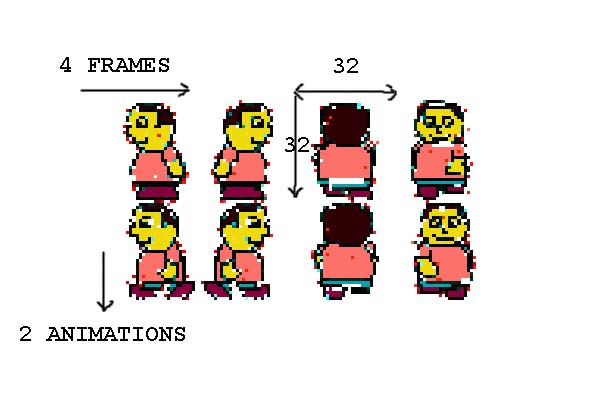OLPCities/The avatar: Difference between revisions
No edit summary |
No edit summary |
||
| Line 107: | Line 107: | ||
We will use the arrow keys to move the avatar. The capture of the press of the key occurs inside a "timer loop". |
We will use the arrow keys to move the avatar. The capture of the press of the key occurs inside a "timer loop". |
||
The first frame of the avatar has the value 0 (zero). For the avatar going down we do: <b>av.setFrame(3)</b>. |
The first frame of the avatar has the value 0 (zero). For the avatar to be going down in the "init", we do: <b>av.setFrame(3)</b>. |
||
Changing the direction of the movement of the avatar, the frame changes. We use the method: <b>setFrameByDirection</b> to define it. And we change the direction using the arrow keys and the method: <b>setDir</b>. |
Changing the direction of the movement of the avatar, the frame changes. We use the method: <b>setFrameByDirection</b> to define it. And we change the direction using the arrow keys and the method: <b>setDir</b>. |
||
Revision as of 16:13, 21 September 2006
You can find avatares at our Inventory. The link is: Avatares. You can use one of them or create a nes . Remember to put it available for everybody. An avatar has some "frames" and some "animations". The size of one "cell" is 32 x 32 pixels.
At this lesson we will add an avatar to the Lot of the previous. We will use (take a look) elements of the Classes:
We will make some comentaries about the code of the page:
<html>
<head>
<script language="Javascript" src="http://www.dmu.com/olpc/gamelib_core.js"></script>
<script language="Javascript" src="http://www.dmu.com/olpc/gamelib_sprites.js"></script>
<script language="Javascript" src="http://www.dmu.com/olpc/gamelib_keyboard.js"></script>
<script language="Javascript">
function init(){
Sp_linuxcompatible=true;
Gl_preloader("floorW05N07.gif");
Gl_preloader("plaquehello.gif");
Gl_preloader("avat1.gif");
upkey=Kb_trapkey("UP");
downkey=Kb_trapkey("DOWN");
rightkey=Kb_trapkey("RIGHT");
leftkey=Kb_trapkey("LEFT");
av=new Sp_Sprite();
av.setImage("avat1.gif",32,32,4,2);
av.setXlimits(5,610);
av.setYlimits(5,385);
av.moveTo( 300,170);
av.setFrame(3);
av.setFrameByDirection(90,90,1,180,180,3,270,270,0,0,0,2);
av.setAnimation(0);
av.setZ(10);
av.collides=true;
av.useHitEvents(true);
av.setAnimationSpeed(3);
av.switchOn();
floor=new Sp_Sprite();
floor.setImage("floorW05N07.gif",614,390,1,1);
floor.setXlimits( 0,616);
floor.setYlimits( 0,390);
floor.setFrame(0);
floor.moveTo(0 , 0 );
floor.setZ(5);
floor.switchOn();
pl=new Sp_Sprite();
pl.setImage("plaquehello.gif",179,101,1,1);
pl.setXlimits( 0,614);
pl.setYlimits( 0,390);
pl.setFrame(0);
pl.moveTo(355 , 45 );
pl.setZ(12);
pl.makeHard();
pl.switchOn()
Gl_hook("timestep()");
Gl_start();
}
function timestep(){
av.setSpeed(0);
av.setAnimationRepeat(0);
if(rightkey.pressed){
av.setDir(1,0);
av.setAnimationRepeat(-1);
av.setSpeed(2);
}
else if(leftkey.pressed){
av.setDir(-1,0);
av.setAnimationRepeat(-1);
av.setSpeed(2);
}
else if(downkey.pressed){
av.setDir(0,1);
av.setAnimationRepeat(-1);
av.setSpeed(2);
}
else if(upkey.pressed){
av.setDir(0,-1);
av.setAnimationRepeat(-1);
av.setSpeed(2);
}
}//timestep
</script>
</head>
<title>TUTCITY </title>
<body bgcolor="black" onload="init()" >
</html>
We are pre-loading all the images. The OLPC browser wait the load of all the images to open the page/Lot.
We will use the arrow keys to move the avatar. The capture of the press of the key occurs inside a "timer loop".
The first frame of the avatar has the value 0 (zero). For the avatar to be going down in the "init", we do: av.setFrame(3).
Changing the direction of the movement of the avatar, the frame changes. We use the method: setFrameByDirection to define it. And we change the direction using the arrow keys and the method: setDir.
Pay attention that: to make the avatar to collide against the plaque, we have used: pl.makeHard(). The plaque is not one of the 3D objects. For "3D objects" the avatar has a more sophisticated behavior, going in front or behind them. You can make all the objects in your Lot to be 3D, but you will work too much. The idea is to make 3D only objects in the "streets" or inside "houses".
